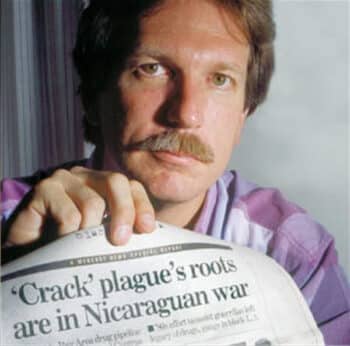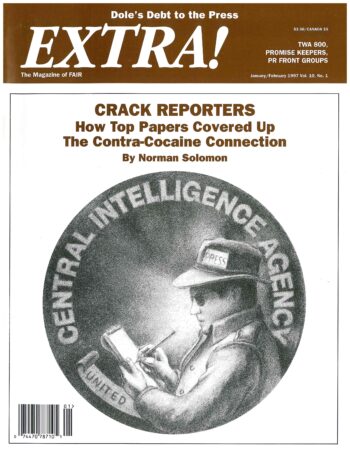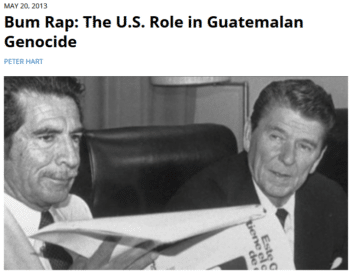Twenty years ago this month, on December 10, 2004, former San Jose Mercury News investigative reporter Gary Webb died by apparent suicide, following a stretch of depression. The subject of the 2014 film Kill the Messenger, Webb had left the newspaper in 1997 after his career was systematically destroyed because he had done what journalists are supposed to do: speak truth to power.

Journalist Gary Webb (1955–2004)
In August 1996, Webb penned a three-part series for the Mercury News (8/18—20/96) that documented how profits from the sale of crack cocaine in Los Angeles in the 1980s had been funneled to the Contras, the right-wing, CIA-backed mercenary army responsible for helping to perpetrate, to borrow Noam Chomsky’s words, “large-scale terrorist war” against Nicaragua. At the same time, the crack epidemic had devastated Black communities in South Central LA—which meant that Webb’s series generated understandable uproar among Black Americans across the country.
But Webb’s revelations should hardly have been a newsflash. As FAIR’s Jim Naureckas (10/21/14) noted in a 2014 dispatch, the CIA was informed
as early as September 1981 that a major branch of the Contra “leadership had made a decision to engage in drug-smuggling to the United States in order to finance its anti-Sandinista operations,” according to the CIA inspector general’s report.
Not that the CIA was any stranger to drug-running—as indicated by, inter alia, a 1993 op-ed appearing in the New York Times (12/3/93) under the headline “The CIA Drug Connection Is as Old as the Agency.” The essay traced CIA ties to narco-trafficking back to the Korean War, while the Vietnam War reportedly saw heroin from a refining lab in Laos “ferried out on the planes of the CIA’s front airline, Air America.” The piece went on to emphasize that “nowhere…was the CIA more closely tied to drug traffic than it was in Pakistan” during the Afghan/Soviet war of 1979 to 1989.
Decade-long suppression of evidence

Norman Solomon (Extra!, 1–2/97): “Besides self-serving denials, journalistic critics of the Mercury News offered little to rebut the paper’s specific pieces of evidence.”
And yet, in spite of such established reality, Webb was subjected to a concerted assault by the corporate media, most notably the New York Times, Washington Post and LA Times, as detailed in a 1997 intervention by FAIR’s Norman Solomon (Extra!, 1—2/97). The media hit job relied heavily on denials from the CIA itself—as in “CIA Chief Denies Crack Conspiracy” (11/16/96), one of the examples cited by Solomon—which is kind of like saying that the bear investigated the sticky goo on his paws and determined that he was not the one who got into the honeypot. In December 1997, the same month Webb left the Mercury News after being discredited across the board and abandoned by his own editors, the New York Times (12/19/97) reassured readers that the “CIA Says It Has Found No Link Between Itself and Crack Trade.”
As Solomon argued, “The elite media’s attacks on the series were clearly driven by a need to defend their shoddy record on the Contra-cocaine story—involving a decade-long suppression of evidence” (Extra!, 7/87; see also 3—4/88). Time and again, the nation’s leading media outlets had buried or obstructed news suggesting Contra-cocaine links; Naureckas (10/21/14) pointed out that the Washington Post
ignored Robert Parry and Brian Barger’s groundbreaking AP article (12/20/85), which first revealed the involvement of Contras in drug-running, and then failed to follow up as smaller papers reported on Contra-related cocaine traffic in their backyards (In These Times, 8/5/87).
As a senior Time magazine editor acknowledged to a staff writer whose 1987 story on Contra-related cocaine traffic was ultimately scrapped (Extra!, 11/91):
Time is institutionally behind the Contras. If this story were about the Sandinistas and drugs, you’d have no trouble getting it in the magazine.
‘Hospitable to the most bizarre rumors’
In addition to attacking Webb, many media commentators took care to suggest that the reason Black Americans were so up in arms over the Mercury News series was that they were simply prone to conspiracy theories and paranoia. In October 1996, for instance, Washington Post columnist Richard Cohen (10/24/96) declared pompously that “a piece of Black America remains hospitable to the most bizarre rumors and myths—the one about the CIA and crack being just one.” Bizarre, indeed, that Black folks might be not so trusting of the government in a country founded on, um, slavery—where to this day, racist persecution remains standard operating procedure rather than rumor.
Furthermore, much of the CIA’s behavior over the years beats any conspiracy theory hands down. The agency’s mind-control program MKUltra comes to mind, which operated from 1953 until the early 1960s and entailed administering drugs like LSD to people in twisted and psychologically destructive experiments. Stephen Kinzer, author of Poisoner in Chief: Sidney Gottlieb and the CIA Search for Mind Control, described in an interview with NPR (11/20/20) how MKUltra
was essentially a continuation of work that began in Japanese and Nazi concentration camps. Not only was it roughly based on those experiments, but the CIA actually hired the vivisectionists and the torturers who had worked in Japan and in Nazi concentration camps to come and explain what they had found out so that we could build on their research.
In 2012, NBC News reported on a lawsuit against the U.S. federal government by the “sons of a Cold War scientist who plunged to his death in 1953 several days after unwittingly taking LSD in a CIA mind-control experiment.” In short, who needs conspiracy theories when you have the CIA?
Connecting the dots

Peter Hart (FAIR.org, 5/20/13): “If accountability for genocide is an important value, then it would stand to reason that U.S. media would pay some attention to a genocide that our own government facilitated.”
The question remains, however, as to why Webb underwent such a vicious assault when, at the end of the day, Contra drug-running was no more nefarious than anything else Washington was up to in the Americas. Objectively speaking, reports of the infliction of “large-scale terrorist war” against Nicaraguan civilians should have raised the same alarms, and prompted as extreme an establishment backlash, as narco-activity by CIA mercenaries. Plus, the whole Iran/Contra scandal should have already alerted Americans to their government’s propensity for lying—not to mention violating its own laws.
Around the same time that the U.S. was enabling Contra crimes, of course, it was also backing genocide in Guatemala, facilitating mass slaughter by the right-wing Salvadoran military and allied paramilitary groups, and nurturing Battalion 316, “a CIA-trained military unit that terrorized Honduras for much of the 1980s”—as the Baltimore Sun (6/13/95) put it. In December 1989, the U.S. went about bombing the living daylights out of the impoverished Panama City neighborhood of El Chorrillo, killing up to several thousand civilians and earning the area the moniker “Little Hiroshima.”
While Contra drug-running thus cohered just fine with imperial foreign policy, it seems that Webb’s fundamental crime was connecting the dots between U.S.-backed wars on civilians abroad and the U.S. war on its own domestic population, which continues to disproportionately target Black communities. After all, under capitalism, all men are not created equal, and the institutionalized overlap of racial and socioeconomic inequality partially explains why African Americans have a lower life expectancy than whites—and how we’ve ended up in a situation in which white police officers regularly shoot unarmed Black people.
But there we go again with those “bizarre” conspiracy theories.
Now, two decades after Webb’s death, the U.S. government obviously hasn’t managed to kick the habit of wreaking lethal havoc at home and abroad—including in the Gaza Strip, where U.S. funding of the ongoing Israeli genocide of Palestinians has been accompanied by a calculated media campaign to obscure reality. Rather than speak truth to power, journalists have lined up to faithfully spout one untruth after another on power’s behalf, rendering themselves effectively complicit in genocide itself. And as the major outlets trip over each other to toe the establishment line, the corporate media is more of a conspiracy than ever.
Belén Fernández is the author of The Imperial Messenger: Thomas Friedman at Work and Martyrs Never Die: Travels through South Lebanon.

